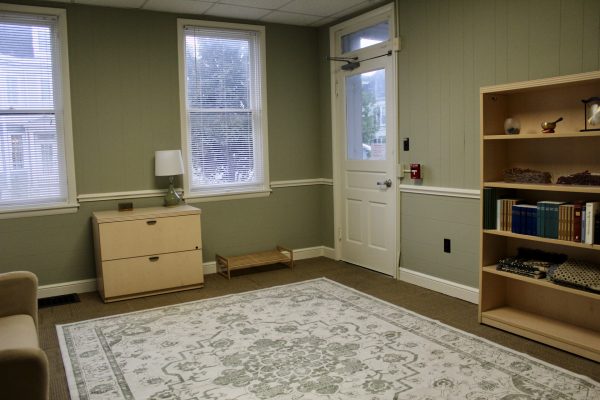C.F. Hosts First Salon
The Clarke Forum for Contemporary Issues hosted its first Salon discussion event on Friday, Oct. 2 on the topic of trigger warnings and hate speech on college campuses. Thirty-five students from all class years and several faculty and staff members gathered at the Clarke Forum offices on W. Louther St. for a discussion that lasted an hour and a half.
The event was co-sponsored by the Clarke Forum, the Office of Academic Advising, and Phi Beta Kappa. Amy Farrell, professor of American Studies and Women’s and Gender Studies and executive director of the Clarke Forum, specifically advertised the event to Women’s and Gender Studies and American Studies students, the Social Justice House, Clarke Forum interns, and the Alpha Lambda Delta and Phi Beta Kappa honors societies, but the event was open to all students. Students were asked to RSVP and read three articles about the topic, selected by Farrell, prior to attending.
“We were planning to advertise widely, but we had filled the event before we sent out the wider notice,” Farrell said. “We want to limit salons to about 30 people so that everyone can really get a chance to participate, listen and share their ideas.”
According to Greg Lukianoff and Jonathan Haidt, the authors of a Sept. 2015 Atlantic Monthly article that was one of the required texts for the discussion, “trigger warnings are alerts that professors are expected to issue if something in a course might cause a strong emotional response.”
One of the first attendees to speak his mind was Professor Marc Mastrangelo, department chair and professor of Classical Studies. He stressed his opinion on the importance of separating emotional reasoning and critical reasoning, so as to be able to complete the course work despite personal experiences.
“If we emotionally reason, we can’t learn,” Mastrangelo stated. “[It is] very important that we are able to confront the real world as it is, as it was…it’s not really about your feelings, it’s about your thinking.”
This perspective sparked a response from several of the students gathered who believed that bringing emotions into one’s studies and teaching was an important part of thinking critically and understanding the material.
Another point raised was whether or not today’s generation was “softer” or “more fragile” than previous generations, which is why trigger warnings could be considered necessary.
“Is this generation of students more fragile?,” Mastrangelo asked. “The answer is yes. I’m dealing with a different kind of student population.”
Isaiah Gibson ’17 disagreed.
“I don’t believe that we are a fragile generation. I believe that we are a generation of activists,” Gibson said.
Kerry Richmond ’16 agreed with Gibson and stated that she thought the reason that trigger warnings are more prevalent today than they were in the past is because the world is becoming more aware of psychological disorders and what can be potentially harmful to certain people.
“To me, this discussion of trigger warnings is about reimagining what we want the world to be like,” Richmond stated. “Why are we trying to deal with the real world rather than [creating] a better world?”
Associate Professor of American Studies Jerry Philogene raised many points about being unsure where to reconcile critical thinking and psychological sensitivity.
“How do you balance a critical engagement and causing someone to relive a traumatic moment in their lives [such as] racial injustice or sexual assault?” Philogene asked. “You want the teaching space to be a critical space to make people uncomfortable to show the real world…we have a moral panic about these trigger warnings. We’re talking about a tussle over what we’re teaching and how we’re teaching.”
Richmond also commented on the issue of teaching with or without trigger warnings.
“You have to recognize that there are experiences that connect to the theories being taught…It hasn’t always been a part of education, but that doesn’t mean it can’t be,” Richmond said.
Farrell received positive feedback about the event and welcomes student input on future discussion topics.
“We certainly will have other Salons in the future,” Farrell said. “I am especially interested to know what interests students and what readings they would like to include with them.”



